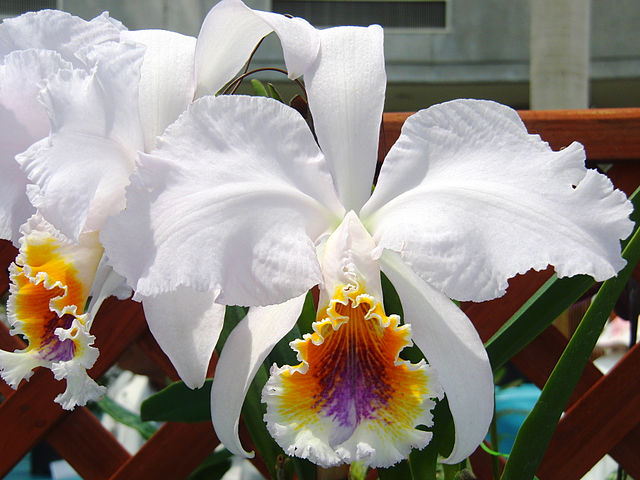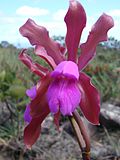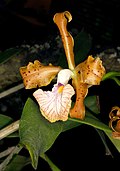Top Qs
Timeline
Chat
Perspective
Cattleya
Genus of orchids From Wikipedia, the free encyclopedia
Remove ads
Cattleya (/ˈkætliə/)[2] is a genus of orchids from Costa Rica south to Argentina.[1] The genus is abbreviated C in trade journals.[3]
Remove ads
Description
Epiphytic or terrestrial orchids with cylindrical rhizome from which the fleshy noodle-like roots grow. Pseudobulbs can be conical, spindle-shaped or cylindrical; with upright growth; one or two leaves growing from the top of them. The leaves can be oblong, lanceolate or elliptical, somewhat fleshy, with smooth margin. The inflorescence is a terminal raceme with few or several flowers. Flowers have sepals and petals free from each other; the lip or labellum (lowermost petal), usually has a different coloration and shape from the rest of the flower and covers in part the flower column forming a tube. There are four pollinia (bag-like organs that contain pollen). The fruit is a capsule with many small seeds.[4][5][6]
Remove ads
Taxonomy
Summarize
Perspective
The genus was named in 1824 by John Lindley after horticulturalist William Cattley. Cattley obtained a specimen of then unnamed Cattleya labiata from William Swainson who had discovered the new plant in Pernambuco, Brazil, in 1817. The plant successfully bloomed under the care of Cattley and it became the type specimen from which Lindley described C. labiata.[7]
Currently accepted species and subgeneric division within genus Cattleya are:[8][9][10][11][12][13]
- Subgenus Cattleya
- Section Cattleya
- Section Crispae
- Series Cattleyodes
- Series Hadrolaelia
- Series Microlaelia
- Series Parviflorae
- Series Sophronitis
- Section Lawrenceanae
- Subgenus Cattleyella
- Subgenus Intermediae
- Subgenus Maximae
Subgenus Cattleya
Section Cattleya
Section Crispae
Series Cattleyodes
Series Hadrolaelia
Series Microlaelia
Series Parviflorae
Series Sophronitis
Section Lawrenceanae
Subgenus Cattleyella
Subgenus Intermediae
Subgenus Maximae
Remove ads
Natural hybrids
Currently accepted natural hybrids are:[13]
- Cattleya × adrienne (= Cattleya pumila × Cattleya jongheana) (Brazil)
- Cattleya × albanensis
- Cattleya × amanda
- Cattleya × binotii (= ) (Brazil)
- Cattleya × brasiliensis (= C. bicolor × C. harrisoniana) (Brazil)
- Cattleya × braunae
- Cattleya × britoi (= C. crispata x C. mirandae) (Brazil - Minas Gerais)
- Cattleya × brymeriana (= C. violacea × C. wallisii) (N. Brazil).
- Cattleya × calimaniana (Brazil)
- Cattleya × calimaniorum (NE Brazil)
- Cattleya × carassana (Brazil)
- Cattleya × cattleyioides (Brazil)
- Cattleya × cipoensis (Brazil)
- Cattleya × colnagiana (Brazil).
- Cattleya × cristinae (Brazil).
- Cattleya × cypheri
- Cattleya × dasilvae
- Cattleya × dayana (= C. forbesii × C. guttata) (Brazil).
- Cattleya × deckeri
- Cattleya × delicata
- Cattleya × diamantinensis (= C. pfisteri × C. sincorana) (Brazil).
- Cattleya × dolosa (= C. loddigesii × C. walkeriana) (Brazil).
- Cattleya × dukeana (= C. bicolor × C. guttata) (SE. Brazil).
- Cattleya × duveenii (= C. guttata × C. harrisoniana) (SE. Brazil).
- Cattleya × elegans
- Cattleya × ericoi
- Cattleya × feldmanniana
- Cattleya × fidelensis (Brazil - Rio de Janeiro).
- Cattleya × frankeana
- Cattleya × gaezeriana
- Cattleya × gerhard-santosii
- Cattleya × gottoana
- Cattleya × gransabanensis (= C. jenmanii × C. lawrenceana) (Venezuela).
- Cattleya × gravesiana (= C. lueddemanniana × C. mossiae) (Venezuela).
- Cattleya × hardyana (= C. dowiana var.aurea × C. warscewiczii) (Colombia).
- Cattleya × heitoriana
- Cattleya × hummeliana
- Cattleya × hybrida (= C. guttata × C. loddigesii) (SE. Brazil).
- Cattleya × imperator (= C. granulata × C. labiata) (NE. Brazil).
- Cattleya × intricata (= C. intermedia × C. leopoldii) (S. Brazil).
- Cattleya × irrorata
- Cattleya × isaacii
- Cattleya × isabella (= C. forbesii × C. intermedia) (SE. Brazil).
- Cattleya × itabapoanaensis
- Cattleya × jetibaensis
- Cattleya × joaquiniana (= C. bicolor × C. walkeriana) (Brazil) .
- Cattleya × kautskyi (= C. harrisoniana × C. warneri) (SE. Brazil).
- Cattleya × kerchoveana
- Cattleya × labendziana
- Cattleya × lambari
- Cattleya × lilacina
- Cattleya × lucieniana (= C. forbesii × C. granulosa) (SE. Brazil).
- Cattleya × macguiganii
- Cattleya × measuresii (= C. aclandiae × C. walkeriana) (E. Brazil).
- Cattleya × mesquitae (= C. nobilior × C. walkeriana) (Brazil).
- Cattleya × mingaensis
- Cattleya × mixta (= C. guttata × C. schofieldiana) (Brazil).
- Cattleya × moduloi (C. schofieldiana × C. warneri) (Brazil).
- Cattleya × mucugensis
- Cattleya × neocalimaniana
- Cattleya × neocalimaniorum
- Cattleya × neoreginae
- Cattleya × nesyana
- Cattleya × occhioniana
- Cattleya × odiloniana
- Cattleya × patrocinii (= C. guttata × C. warneriana) (SE. Brazil).
- Cattleya × picturata (= C. guttata × C. intermedia) (SE. Brazil).
- Cattleya × pittiana
- Cattleya × porphyritis
- Cattleya × porphyrophlebia
- Cattleya × raganii
- Cattleya × resplendens (= C. granulosa × C. schilleriana) (NE. Brazil)
- Cattleya × rigbyana
- Cattleya × ruschii
- Cattleya × sancheziana
- Cattleya × schroederiana
- Cattleya × schunkiana
- Cattleya × schunkii
- Cattleya × scita (= C. intermedia × C. tigrina) (S. Brazil).
- Cattleya × sgarbii
- Cattleya × sororia
- Cattleya × tenuata (= C. elongata × C. tenuis) (Brazil) .
- Cattleya × varelae
- Cattleya × venosa (= C. forbesii × C. harrisoniana) (Brazil).
- Cattleya × verelii
- Cattleya × victoria-regina ( C. guttata × C. labiata) (NE. Brazil).
- Cattleya × victoriacarolinae
- Cattleya × wetmorei
- Cattleya × whitei
- Cattleya × wilsoniana (= C. bicolor × C. intermedia). (Brazil).
- Cattleya × wyattiana (= C. crispa × C. lobata). (Brazil).
- Cattleya × zaslawskii (= C. harpophylla × C. praestans). (Brazil).
- Cattleya × zayrae (= C. amethystoglossa × C. elongata). (Bahia, Brazil)
Remove ads
Nothogenera
This section needs expansion. You can help by adding to it. (March 2021) |
Hybrids of Cattleya and other genera are placed in the following nothogenera:
- × Brassocattleya = Brassavola × Cattleya
- × Brassolaeliocattleya = Brassavola × Cattleya × Laelia
- × Cattleytonia = Cattleya × Broughtonia
- × Laeliocattleya = Cattleya × Laelia
- × Rhyncholaeliocattleya = Rhyncholaelia × Cattleya
Cultivation

- Light
- Cattleyas need light, but not direct sunlight; in case of intense sunlight, shade must be provided.[14]
- Temperature
- Day temperatures must be between 25–30 °C (77–86 °F) and night temperatures not lower than 10–12 °C (50–53.6 °F).[14]
- Humidity
- Must be between 40–70% with good ventilation; however plants must not be exposed to air currents.[15]
- Watering
- Water only if substrate is dry. It can be done once a week, but it all depends on the environmental conditions and the season.[15]
- Fertilizing
Remove ads
References
External links
Wikiwand - on
Seamless Wikipedia browsing. On steroids.
Remove ads




























































































